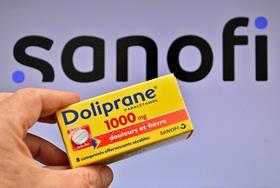
French pharma giant Sanofi is selling off its consumer healthcare business Opella. US-based investment firm Clayton, Dubilier & Rice (CD&R) is to take a controlling 50% stake, while Sanofi will retain a 48% interest. The remaining shares are being sold to France’s state-owned investment bank Bpifrance in a move that the French government hopes will keep Opella’s headquarters in the country.
Opella’s portfolio covers a range of over-the-counter medicines and dietary supplements and includes well-known brands like Allegra (fexofenadine) and France’s best-selling drug Doliprane (paracetamol). The company operates 13 manufacturing sites and four research and development centres and employs over 11,000 people globally. An announcement by Sanofi and CD&R noted that the deal values Opella at €16 billion (£13.3 billion) and would be concluded in the second quarter of next year at the earliest.
Consumer healthcare requires the skills and talent closer to fast-moving consumer goods than prescription pharmaceuticals
Tobias Handschuh, Oliver Wyman
‘We share the love and emotional attachment to Opella’s brands, hence our decision to remain vested in its future. We will support Opella on its path to become an independent company, grounded in talented people, a deep consumer expertise and a truly global presence with deep roots in France,’ said Sanofi’s chief executive Paul Hudson. ‘Our chosen partner CD&R has demonstrated unique capabilities in the consumer space, with deep values of respect for employees, customers, communities in which they operate, and the environment.’
The sale comes as Sanofi aims to accelerate its R&D investments and increase focus on its biopharma business. The move reflects a wider trend across the industry, with several major pharma companies splitting off their consumer health divisions in recent years.
‘Until about five years ago, the dominant strategic trend in big pharma has been a fight for scale and size. We saw many mega-mergers creating the giants of the industry today. Diversification was also part of the strategy: mostly consumer health and animal health,’ explains Tobias Handschuh, an expert on commercial strategy in the life sciences sector based at the management consultancy firm Oliver Wyman. ‘Consumer health … served as a way to extend the life cycle of prescription medicines for common ailments … and animal health served as a way to commercialise medicines that worked well in animal models, during research, but did not make it to human clinical trials.’
Handschuh notes that ‘this has changed significantly’, with many pharma companies now becoming more focused and pursuing strategies based on innovative prescription drug portfolios. GSK, Johnson & Johnson, Pfizer, Novartis and Bayer have all split off consumer divisions or generics businesses in recent years. According to Handschuh, the key driver behind this trend is the contrasting capabilities needed to run different types of life science business. ‘Consumer healthcare requires the skills and talent closer to fast-moving consumer goods companies than prescription pharmaceuticals,’ he says.
These differences apply across the supply chain, Handschuh adds. ‘R&D in pharma is about discovering new molecules and new modalities … whereas in consumer health it is more about product and formulation development, and other minor innovations in packaging and presentation,’ he says. ‘In manufacturing, big pharma is about safety first, at the expense of cost effectiveness, whereas in consumer health, it is about procuring the active ingredients – mostly generic – and cost effective production. In marketing and sales, pharma’s key customers are the healthcare professionals and payers … and in consumer health it is about direct to consumer marketing and trade promotion in the pharmacy or retail sector.’
The involvement of Bpifrance in the deal appears to stem from the French government’s desire to quell fears that Opella’s headquarters could move abroad. On X, formerly known as Twitter, the economy minister Antoine Armand wrote that the French government had secured ‘guarantees’ that the company and its 1700-strong French workforce would be maintained in the country. Handschuh notes that the move is in line with France’s Healthcare Innovation 2030 strategy, which was launched three years ago and aims to bolster the country’s life sciences sector.
